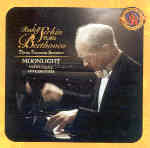Rudolf Serkin’s classic 1962 recordings of Beethoven’s so-called “name” sonatas boast marginally fuller transfers here than in previous editions, but not to the point where upgrading should be your priority. What makes them special? Take the “Moonlight” sonata’s opening adagio, for example. At first Serkin’s slow, tightly-held basic tempo conveys a tense and severe landscape. Listen further and you’ll notice subtle nuances, dynamic gradations, and a genuine chamber-like relationship between the lyrical right-hand melody, the triplet accompaniment, and the bass line. Similar interplay distinguishes the C minor sonata’s central movement. Serkin enhances the first-movement introduction’s dark drama by double-dotting the notes and controversially repeats this section as well as the exposition. The outer movements of the “Appassionata” are propulsive and flowing–the very model of rhythmic backbone–yet there’s nothing remotely mechanical or routine in the execution.
As a bonus, Sony gives us Serkin’s “Les Adieux” from his December, 1977 television concert. The Carnegie Hall acoustic slightly beefs up the pianist’s gaunt sonority. Those who enjoy the suave and effortlessly fleet Les Adieux sonatas by Solomon, Ivan Moravec, and Richard Goode might be put off by Serkin’s deliberation and total lack of charm. Yet the pianist’s concentration and sense of the music’s long lines make a more cogent case for this approach (perhaps Sony might one day resurrect Serkin’s mono, studio version). In sum, these performances were built to last. [12/13/2003]
































